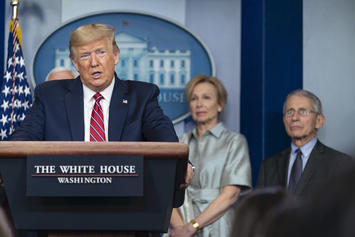
Long after the pandemic has receded, its long-term impact on our society and political life will continue. Just as plagues past have reshaped the trajectory of cities and civilizations, sometimes with fearsome morbidity, COVID-19 is already having a profoundly disruptive impact on our political future.
Rather than uniting humanity against a common foe, the pandemic seems to be widening the internal political chasm between nations and within them. The “battle,” “war,” or “crusade” against the novel coronavirus has not to date reprised the London Blitz, Pearl Harbor, or the World Trade Center attack in 2001, during which people closed ranks, even if they thought little of their country’s leaders.
Democrats like party strategist James Carville and Speaker Nancy Pelosi insist that Trump has “blood on his hands” and one of Pelosi’s more excitable colleagues has suggested that Trump be tried in The Hague for his handling of the pandemic. On the Right, meanwhile, the pandemic has engendered, in the US and elsewhere, a predictably anti-China and nativist tone, which have sometimes drifted into overt racism, particularly in Italy. Some journalists toss around terms like “Manchurian media,” a regrettable throwback to McCarthyism.
This is no way to handle a global pandemic. Most Americans, according to a recent survey, would prefer a more collaborative approach. They have so far been disappointed. At a time when we need a rational discussion of policy alternatives and a thoughtful debate among experts, including not just epidemiologists, but also economists, psychologists, and social scientists, we are seeing an escalation of finger-pointing, blame-shifting, and character assassination from both sides.
The globalized politics of the pandemic
Throughout history, pandemics have periodically devastated great cities like Rome, Constantinople, and Cairo. Repeated exposure to sickness slowed the recovery of European cities throughout the Middle Ages and ravaged the great cities of the Renaissance. Diseases imported from the West devastated the once proud cities of Meso-America and Peru, making them more easily overcome by the Hispanic conquistadors.1 Later on, the disease-ridden slums of the industrial age helped to spark socialist insurrections almost everywhere, and in Russia, at least, to grievous political effect.
Today’s global pandemic is far less lethal, but it is rearranging global politics nonetheless, most obviously through the growing conflict between the world’s two dominant powers, China and the United States. The conservative press, President Trump, and Boris Johnson have blamed China for the pandemic. In response, Beijing claims their approach has been more successful, and demonstrates that authoritarians are able to deal with crises more efficiently than less ordered and obedient Western democracies.
Read the rest of this piece at Quillette.
Joel Kotkin is the Presidential Fellow in Urban Futures at Chapman University and Executive Director for Urban Reform Institute — formerly the Center for Opportunity Urbanism. His last book was The Human City: Urbanism for the Rest of Us (Agate, 2017). His next book, The Coming of Neo-Feudalism: A Warning to the Global Middle Class, is now available to preorder. You can follow him on Twitter @joelkotkin
Reference:
1 William McNeil, Plagues and Peoples, (Garden City, NY, 1976). pp.2, 13, 207, 208
Photo credit: The White House via Flickr.












